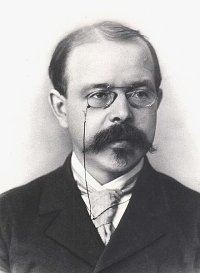‘Twas Euclid, and the theorem pi
Did plane and solid in the text,
All parallel were the radii,
And the ang-gulls convex’d.
“Beware the Wentworth-Smith, my son,
And the Loci that vacillate;
Beware the Axiom, and shun
The faithless Postulate.”
He took his Waterman in hand;
Long time the proper proof he sought;
Then rested he by the XYZ
And sat awhile in thought.
And as in inverse thought he sat
A brilliant proof, in lines of flame,
All neat and trim, it came to him,
Tangenting as it came.
“AB, CD,” reflected he–
The Waterman went snicker-snack–
He Q.E.D.-ed, and, proud indeed,
He trapezoided back.
“And hast thou proved the 29th?
Come to my arms, my radius boy!
O good for you! O one point two!”
He rhombused in his joy.
‘Twas Euclid, and the theorem pi
Did plane and solid in the text;
All parallel were the radii,
And the ang-gulls convex’d.
— Emma Rounds




